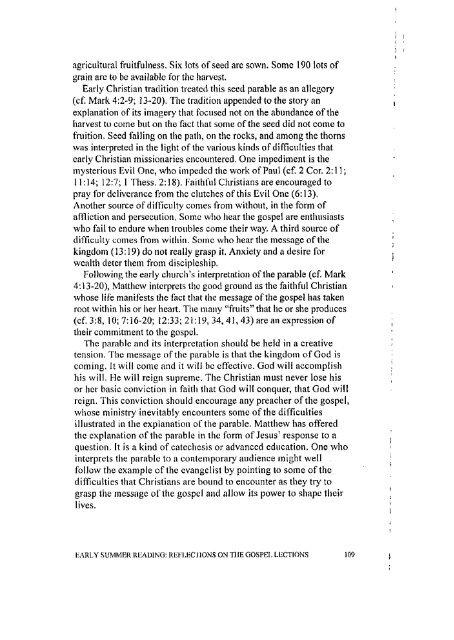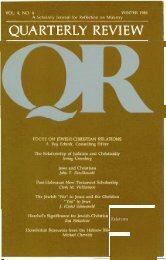Spring 1999 - Quarterly Review
Spring 1999 - Quarterly Review
Spring 1999 - Quarterly Review
Create successful ePaper yourself
Turn your PDF publications into a flip-book with our unique Google optimized e-Paper software.
agricultural fruitfulness. Six lots of seed are sown. Some 190 lots ofgrain are to be available for the harvest.Early Christian tradition treated this seed parable as an allegory(cf. Mark 4:2-9; 13-20). The tradition appended to the story anexplanation of its imagery that focused not on the abundance of theharvest to come but on the fact that some of the seed did not come tofruition. Seed falling on the path, on the rocks, and among the thornswas interpreted in the light of the various kinds of difficulties thatearly Christian missionaries encountered. One impediment is themysterious Evil One, who impeded the work of Paul (cf. 2 Cor. 2:11;11:14; 12:7; 1 Thess. 2:18). Faithful Christians are encouraged topray for deliverance from the clutches of this Evil One (6:13).Another source of difficulty comes from without, in the form ofaffliction and persecution. Some who hear the gospel are enthusiastswho fail to endure when troubles come their way. A third source ofdifficulty comes from within. Some who hear the message of thekingdom (13:19) do not really grasp it. Anxiety and a desire forwealth deter them from discipleship.Following the early church's interpretation of the parable (cf. Mark4:13-20), Matthew interprets the good ground as the faithful Christianwhose life manifests the fact that the message of the gospel has takenroot within his or her heart. The many "fruits" that he or she produces(cf. 3:8, 10; 7:16-20; 12:33; 21:19, 34, 41, 43) are an expression oftheir commitment to the gospel.The parable and its interpretation should be held in a creativetension. The message of the parable is that the kingdom of God iscoming. It will come and it will be effective. God will accomplishhis will. He will reign supreme. The Christian must never lose hisor her basic conviction in faith that God will conquer, that God willreign. This conviction should encourage any preacher of the gospel,whose ministry inevitably encounters some of the difficultiesillustrated in the explanation of the parable. Matthew has offeredthe explanation of the parable in the form of Jesus' response to aquestion. It is a kind of catechesis or advanced education. One whointerprets the parable to a contemporary audience might wellfollow the example of the evangelist by pointing to some of thedifficulties that Christians are bound to encounter as they try tograsp the message of the gospel and allow its power to shape theirlives.EARLY SUMMER READING: REFLECTIONS ON THE GOSPEL LECTIONS 109












